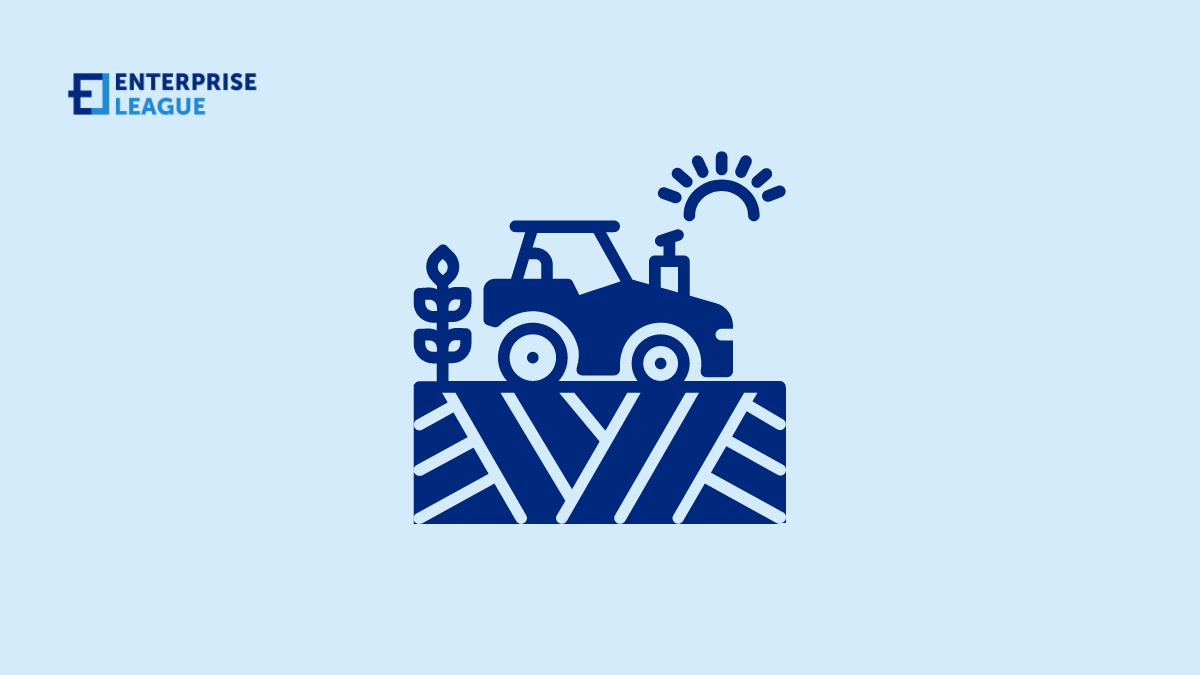Without agriculture, it isn’t possible to have a city, stock market, bank, university, church, or army. Since ancient times the economic development of civilizations around the world depended on agriculture and not just that, agriculture provides sustenance and raw materials which are crucial for people’s daily lives. Given the circumstances, this industry is growing rapidly each year and leads us to believe that will reach $14356.23 billion in 2024 which isn’t a surprise, to be honest. Speaking of agriculture, we have to tell you that agriculture isn’t everyone’s cup of tea and it takes a lot more than vision and optimism, but neither is something that takes a village to start. Agriculture startups are becoming increasingly popular as entrepreneurs recognize the potential in this sector. By setting a clear vision, preparing yourself for the hard work ahead, doing thorough market research, and finding agriculture business ideas that are highly in demand, you can definitely become an owner of a successful agriculture business.
Best 15 agriculture business ideas
Here are some creative and profitable agriculture business ideas that you can start right away:
Hydroponic farming
A hydroponic farming business grows vegetables, herbs, and flowers without soil by instead dissolving nutrients within water-based mediums feeding plant roots prospering under calibrated indoor settings. As community-sourced and organic food popularity accelerates, this sustainable technique proves 75% more efficient utilizing less water and space than traditional agriculture. First focusing on evergreen basics like lettuce, cucumbers, and microgreens takes advantage of shorter cycles from seed to harvest.
Over time, selecting specific strained hybrids, playing music or altering light spectrums may optimize yields and flavors catering to patrons, restaurants, or local grocers. Overall, the controlled indoor system opens new stable local cash crop sources less dependent on weather and seasons. Reducing resource demands through conservation technology aligns ethics with smarter greens.
How much you can make: $50,000 – $500,000 annually
How much does it cost to start: $10,000 – $100,000
How long does it take to build: 6-18 months
Organic farm
Organic farm involves sustainably growing high-quality organic fruits, vegetables, and herbs on leased acres of land to supply regional grocers, restaurants, and households with fresh local produce appreciative of responsible cultivation practices.
This allows for a potentially viable and meaningful microbusiness since small-scale commercial organic farming meets swelling consumer demand desiring nutritious transparency while emissions-conscious dining endorsements further appetite for greens grown via renewable techniques. The eco-sensitive farmer employs rotating crops and integrated pest management minimizing runoff into surroundings.
How much you can make: $50,000-$500,000+/year
How much does it cost to start: $50,000-$500,000
How long does it take to build: 6-24 months
Herb farm
Herb farm involves sustainably cultivating in-demand culinary and medicinal herbs on leased land to supply independent restaurants, grocers, and households wanting a reliable year-round weekly source of ultra-fresh herbs appreciative of responsible cultivation practices.
This allows for a viable microbusiness since artisanal small-batch herb farming serves swelling consumer demand for transparent household cooking ingredients and nutraceuticals while locality-conscious dining further stokes the appetite for aromatics grown via renewable techniques picked at flavor peak. The environmentally-mindful farmer employs rotating beds and integrated pest management minimizing ecosystem disturbance.
How much you can make: $30,000-$100,000+/year
How much does it cost to start: $20,000-$100,000
How long does it take to build: 6-12 months
Mushroom farm
Mushroom farm involves sustainably growing and selling specialty mushroom varieties on optimized beds using burlap and harvested wood chips to supply regional grocers, restaurants, and households with fresh fungi appreciative of ethical cultivation practices within short seasonal turnarounds. This allows for meaningful microbusiness since small-scale mushroom farming taps surging consumer demand preferring locally grown produce while reducing environmental footprints through renewable substrate usage.
An eco-conscious mushroom nursery leverages scalable sustainable land stewardship to provide farm-to-table fungal bounties feeding communities wholesome umami-rich nourishment supporting locavore buyer priorities valuing premium flavor and integrity in crops responsibly nurtured minus industrial machinery carbon emissions.
How much you can make: $50,000-$200,000+/year
How much does it cost to start: $20,000-$100,000
How long does it take to build: 3-6 months
Beekeeping
Beekeeping involves maintaining bee colonies and apiaries to harvest quality bee products like honey, beeswax, and propolis and support regional crop pollination needs for farmers wanting to promote both agricultural output and environmental stability from higher sustainable pollinator levels. This allows for a potentially purpose-driven microbusiness since small-scale beekeeping taps surging farmer demand for pollination services while producing natural sweeteners for consumers supporting biodiversity stewardship through their purchases.
An ethically focused apiary leverages scalable land leasing to foster ecological symbiosis between agriculture and wild colonies by facilitating increased pollinator-powered fruit set for surrounding farms while providing signature hyperlocal honey directly to urban customers further spreading awareness of bees’ indispensable role in botanical husbandry now jeopardized without inventive human initiatives enabling stability.
How much you can make: $20,000-$100,000+/year
How much does it cost to start: $5,000-$20,000
How long does it take to build: 3-6 months
Recreational fish farm
Recreational fish farm involves breeding freshwater fish like trout or bass to sell for stocking non-native species into man-made lakes or ponds for property aesthetics, recreational catch-and-release fishing, and sustainable pest control rather than maximizing harvest yields solely.
For landowners seeking reliable aquatic life beautifying vast spaces otherwise empty aesthetically or recreationally, purposeful fishery cultivation sustains biodiversity supporting localized ecosystems through intentional stewardship Conservation goals may also underpin specialized breeding protecting vulnerable endemic populations close to extinction globally by repopulating resilient strains adaptable easing pressures there at least. Besides supplementary food sales as fish mature extra, the educational showcase offers visitors glimpses into marine biology often obscure from inland external eyes previously.
How much you can make: $50,000-$200,000+/year
How much does it cost to start: $50,000-$200,000
How long does it take to build: 6-12 months
Microgreens farm
Microgreens farm involves sustainably cultivating in-demand microgreens on small leased plots to supply specialty grocers, restaurants, and households wanting ultra-fresh harvesting appreciative of responsible cultivation practices compressing time from seed to salad centrifugally. This allows for a viable micro business since artisanal microgreen farming serves to swell upscale consumer demand for transparent nutritious gourmet supplements while emissions-conscious dining establishments further desire micro-harvests grown via renewable techniques picked at peak vibrancy.
A compact microgreens nursery leverages stewardship of minimized beds to provide just-picked perfection supporting buyers prioritizing superior crispness, progressive horticulture ethics, and farmer directness from soil to plate in living produce for both epicurean palate delight and nutrition advancement over pre-cut greens of indeterminate origin from industrialized chains.
How much you can make: $50,000-$200,000+/year
How much does it cost to start: $10,000-$50,000
How long does it take to build: 1-3 months
Snail farm
Snail farm is raising and breeding edible snails on leased land or climate-controlled habitats to supply specialty food outlets and restaurants seeking fresh niche inventory appreciative of responsible cultivation practices.
This allows for a viable micro business since artisanal snail farming serves to swell upscale consumer demand desiring transparent gourmet escargot ingredients while emissions-conscious dining establishments further appetites for heliciculture raised through renewable techniques. The regenerative farmer employs free-range pens, harvested produce feedstocks, and ethical harvesting standards delighting locavore epicureans.
How much you can make: $30,000-$100,000+/year
How much does it cost to start: $10,000-$50,000
How long does it take to build: 3-6 months
Tea farm
Tea farms involve growing prized tea leaf varieties on leased acres to supply independent grocers, cafes, and households wanting ultra-fresh loose-leaf harvesting appreciative of responsible agroforestry practices. This allows for a viable microbusiness since artisanal small-batch tea farming serves swelling consumer demand preferring transparent provenance in their infusion ingredients while eco-conscious establishments further desire harvests grown regeneratively.
A boutique diversified nursery tea farm leverages scalable stewardship of fertile leased hillsides to provide just-picked perfection supporting buyers prioritizing superior aromatic quality, biodiversity preservation ethics, and farmer-direct supply chain transparency from field to cup in teas for both epicurean and wellness preferences over packaged dust of ambiguous industrialized origin.
How much you can make: $50,000-$200,000+/year
How much does it cost to start: $50,000-$200,000
How long does it take to build: 12-24 months
Juice production
Juice production involves procuring quality fruits and vegetables from regional farms to produce bottled cold-pressed juices using ethical processes transparently preserving nutritive enzymatic content for grocers, cafes, and households appreciative of responsible food-miles minimization manufacturing practices.
Overall, a compact nutritious beverage operation leverages scalable raw material relationships and leased processing equipment to deliver farm-fresh flavor conveniently supporting buyers prioritizing superior purity, digestive benefits and supply chain integrity in produce over imported or shelf-stable packs involving concentrate, preservatives or pasteurization degrading food energy commensurately through industrial efficiencies abroad that cut corners.
How much you can make: $50,000-$200,000+/year
How much does it cost to start: $20,000-$100,000
How long does it take to build: 3-6 months
Lavender farm
A lavender farm business involves cultivating lavender for fragrant floral harvests used in specialty foods, stress-relieving products or decorative bundles driving sustained yields conveniently meeting artisanal community demands reliably. As preferences expand appreciating cultivated botanicals beyond commodity crops ubiquitously, lavender proves a hardy niche crop unlocking prosperity through small-scale agriculture scaling opportunities optimistically.
An independent grower first focuses on mastering the plant’s seasonal care fundamentals before assessing additional value-added products attractively over time gradually. Over time expertise in perfecting tiny-scale harvesting logistics and bunching techniques differentiates capabilities elevated from large commodity producers relatively.
How much you can make: $30,000-$100,000+/year
How much does it cost to start: $20,000-$100,000
How long does it take to build: 6-12 months
Sunflower farm
A sunflower farm business involves cultivating vibrant sunflowers for cheerful floral harvests used in specialty food ingredients, oil production, or decorative bundles driving sustained yields conveniently meeting artisanal community demands reliably.
An independent grower first focuses on mastering the plant’s seasonal care fundamentals before assessing additional value-added products like snacking seeds attractively over time gradually. Over time expertise perfecting efficient harvesting logistics and bunching techniques differentiates capabilities elevated from large commodity producers relatively.
How much you can make: $30,000-$100,000+/year
How much does it cost to start: $20,000-$100,000
How long does it take to build: 6-12 months
Agro-blogging
An agro-blogging business specializes in building educational websites featuring recurring articles and multimedia content tailored around niche farming topics for specific reader interests fruitfully. As online informational needs fragment toward niche passions, dedicated husbandry bloggers attract engaged viewers through consistent troubleshooting insights and soil science basics worth harvesting season over season dependably.
Leveraging both journalistic field research and search engine optimization helps ranked topical blogs stand out as trusted hobby resources delivering kernels of wisdom conveniently by the bushel cost-effectively. Over time diversification between introductory guides, industry news analysis, online courses, and affiliate programs maximizes authority site monetization earning opportunities through multiple sales channels profitably.
How much you can make: $10,000-$100,000+/year
How much does it cost to start: $1,000-$5,000
How long does it take to build: 6-12 months
Agricultural consulting
An agricultural consulting business advises farmers and food producers on best practices for maximizing crop yields, soil health, and operational efficiency fruitfully through specialized expertise convenient by the season or tailored project. As environmental priorities advance appreciating regenerative land stewardship methodologies intrinsically, technical guidance proves vitally effective in unlocking agricultural prosperity despite variables that large corporate viewpoints may overlook narrowly.
An independent agronomist first focuses demonstrations around core annuals or livestock before assessing additional niche specialization toward mushrooms or aquaponics attractively over time gradually. Overall occasional agro-consultancy mastery injects reliable growth worth remembering across rural lifestyles conveniently by nurturing cooperative progress through customized recommendations purposefully.
How much you can make: $50,000-$200,000+/year
How much does it cost to start: $5,000-$20,000
How long does it take to build: 3-6 months
Flower business
An independent grower first focuses on mastering a few profitable annuals and perennials meeting starter market demand before assessing additional value-added products like bouquets or wreaths attractively over time gradually. A local flower nursery injects locavore excitement worth remembering while supplementing incomes through picturesque landscape husbandry cooperatively.
How much you can make: $30,000-$100,000+/year
How much does it cost to start: $10,000-$50,000
How long does it take to build: 3-6 months
Conclusion
The agricultural industry is ripe with opportunities for those willing to think creatively and put in the hard work. So if you have a passion for farming, a desire for entrepreneurship, and a vision for the future of agriculture, there has never been a better time to turn your agricultural business ideas into reality. The resources and support are available, all that’s left is for you to take that first step forward.
More must-read stories from Enterprise League:
- Profitable fitness business ideas you should be aware of.
- Delivery business ideas with strong income potential.
- Woodworking business ideas to keep an eye on.
- Profitable small town business ideas that you can start today.
- Creative art business ideas for turning your artistic talents into profits
Related Articles
Scaling a Business in an Increasingly Remote World
Scaling a business in an increasingly remote world The process of scaling a business meant leasing a larger office and acquiring additional desks. Nowadays, growth means connecting people across various cities and time zones. This new style of work offers a lot of...
Is Fleet Electrification the Future of Automotive Innovation?
The automotive industry never stands still. While flashy consumer electric vehicles grab headlines, the real transformation is happening with commercial vehicles. Delivery vans, trucks, and buses are quietly leading a revolution that could reshape transportation as we...
Why Tone and Voice Matter for Your Website Branding
For digital marketers and website owners, success today means attracting the right audience and establishing a genuine connection through thought-out branding efforts. A website featuring eye-catching visual elements might create a glowing first impression, but...
Scaling a Business in an Increasingly Remote World
Scaling a business in an increasingly remote world The process of scaling a business meant leasing a larger office and acquiring additional desks. Nowadays, growth means connecting people across various cities and time zones. This new style of work offers a lot of...
Is Fleet Electrification the Future of Automotive Innovation?
The automotive industry never stands still. While flashy consumer electric vehicles grab headlines, the real transformation is happening with commercial vehicles. Delivery vans, trucks, and buses are quietly leading a revolution that could reshape transportation as we...






